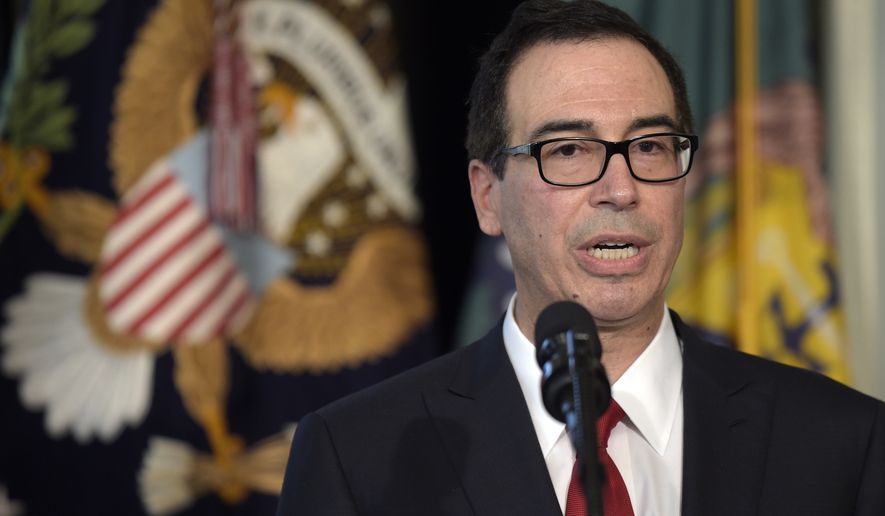The Trump administration Monday slapped new financial sanctions on Syria for the suspected deadly sarin gas attack on civilians earlier this month, targeting 271 people linked to the chemical weapons program of the regime of Syrian President Bashar Assad.
The sanctions, believed to be among the largest ever by the U.S. government, are the latest aggressive action by President Trump to punish the Assad regime for alleged use of chemical weapons — which would be a war crime. The attack killed at least 90 people, including women and children, in a rebel-held area of the country.
“We will not tolerate the use of chemical weapons by any actor and we intend to hold the Assad regime accountable for its unacceptable behavior,” Treasury Secretary Steven Mnuchin said when announcing the sanctions at the White House.
The sanctions freeze financial assets, property and interest in property held by employees of Syria’s Scientific Studies and Research Center, which the U.S. says partly enables the use of chemical weapons. The sanctions also block U.S. companies from doing business with them.
Mr. Mnuchin said it sent “a strong message with this action — that we will not tolerate the use of chemical weapons by any actor.”
After the April 4 gas attack, Mr. Trump launched a U.S. missile strike against a Syrian government air base identified as the source of the attack.
The airfield was hit with 59 Tomahawk missiles and was viewed by the international community as a targeted, decisive action by Mr. Trump, although his administration is still formulating a larger policy for Syria, the country’s seven-year civil war and the ongoing fight against Islamic State and other jihadist groups holding territory in the country.
Mr. Assad has denied using chemical weapon. His denials have been seconded by Russia, the chief sponsor of the regime. Russia was not targeted by the sanctions.
However, Mr. Mnuchin said the impact of the sanctions would be felt beyond Syria’s borders and would affect its allies. He declined to say whether additional measures against Russia were under consideration.
“We don’t comment on the specifics of sanctions that we are going to do in the future,” he said.
Russia recently vetoed a U.N. resolution that would have condemned the use of chemical weapons in Syria and instead called for an international investigation into the attack. China abstained for the first time, a move the White House billed a win for their efforts to isolate Russia.
“On Syria, the Council failed again this month to respond to Syria’s use of chemical weapons,” Mr. Trump said at a White House meeting of U.N. ambassadors from countries on the Security Council. “ … I was very disappointed by that.”
House Foreign Affairs Committee Chairman Ed Royce said added sanctions on Syria were overdue after years of inaction under President Obama.
“For years now, I’ve been calling for sanctions to deny Assad the resources he needs to slaughter innocent men, women and children,” said the California Republican. “These strong and swift actions will make a real difference. And they represent another stark departure from the Obama administration’s dithering on Syria, which only worsened the bloodshed and created a vacuum for ISIS.”
“I applaud the administration for taking these important steps, and will continue to work to advance bipartisan legislation that will give the White House additional leverage to hold Assad — as well as his Russian and Iranian backers — accountable,” said Mr. Royce.
• S.A. Miller can be reached at smiller@washingtontimes.com.




Please read our comment policy before commenting.